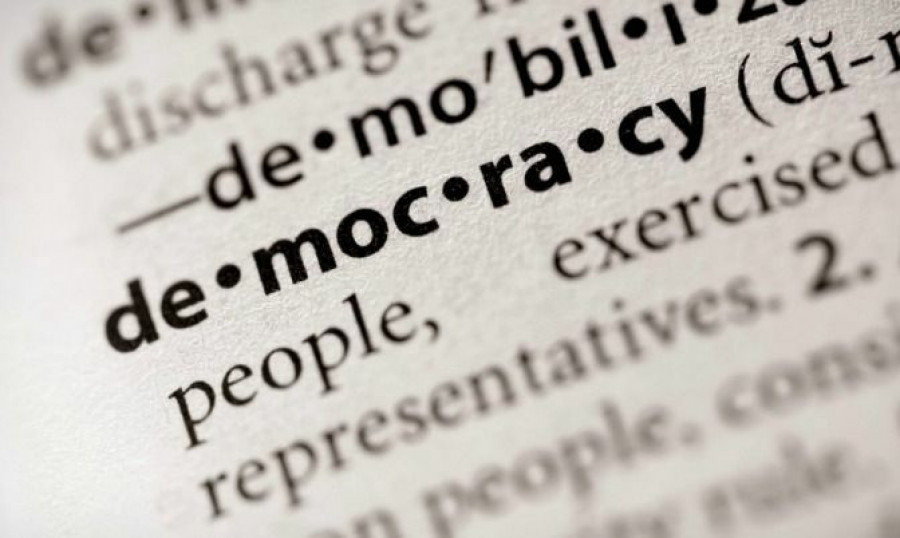These problems include indifferences to “race,” color, creed, and gender. Other dilemmas include climate change, global ethics, war, political apathy, the status of women, global pandemics, and the “economic gap.” The greatest challenge, though, is “democratization of the world.” Is it feasible?
Fortunately, human beings have the patronage of “Spiritual Intelligence” (SQ) (God), “Human Intelligence” (IQ) (Man), and “Artificial Intelligence” (AI) (Machine). These three levels of intelligence ought to be in concord, to achieve our highest potential and capability as a viable species. Philosophically speaking, this writer refers to these three enablers as the “Triad Colossi.” They underpin an orderly society, and human development in five foundations such as (1) spiritual, (2) moral, (3) social, (4) intellectual, and (5) physical.
Democracy needs a system of “just” laws, regulations, policies, principles, creativity and innovative ideas to maintain an orderly society. There is also a need for democratic nations to measure their “moral progress” versus the ideals of democracy, and not merely versus the “moral failings” of other political systems such as communism, dictatorship, socialism, and feudal monarchy. Democracy represents the best opportunity for nations to achieve harmony, but to some people, democracy “falls short” of its noble ideals; to others, democracy has been a “double-edged” sword, because of two opposing ideological “worldviews” (“capitalism” and “socialism”) that underpin our democracy.
Historians recorded democracy back to classical Athens and Greeks in the 16th century B.C. Postmodern democracy projects a bastion of freedoms of expression, good governance, peace organizations, and “fairness and justice” for all, as the “ideals of democracy.” In his Gettysburg address in Pennsylvania on November 19, 1863, Abraham Lincoln (1809-1865), the 16th president of the United States of America said, “…this nation, under God, shall have a new birth of freedom, and that government of the people, by the people, for the people, shall not perish from the earth.”
In the Declaration of Independence in Congress, July 4, 1776, Thomas Jefferson (1743-1826), the 3rd president of the United States of America said, “we hold these truths to be self-evident: that all men are created equal; that they are endowed by their Creator with certain unalienable rights; that among these are life, liberty, and the pursuit of happiness.” These two critical statements are the bedrock of American democracy, and they have helped to establish a beacon of “high ideals,” hopefully, for non-democratic nations to practice.
“To say the least, the experiences of the Greeks and Romans showed how not to do it [solve the problem of constitutional government]…the political structure of the United States is radically different from that of the Greeks or the Romans. It is based upon the Ten Commandments and on the teachings of Christ. Try to rewrite the Declaration of Independence without reference to the Christ axioms. You’ll find it can’t be done!” The Mainspring of Human Progress. Copyright © 1947. Chapter 9: Compromise ― The Romans, p. 91. Henry G. Weaver (1889-1947).
Herein lies the heart of my inquiry. Democracy — Why the Incongruity? In the realm of political systems, democracy stands supreme. Constitutions and national anthems proclaim the name of God as “supreme.” Christian principles underpin the birth of democratic Western nations. Western nations “profess” Christianity, and “practice,” in part, the teachings of Jesus Christ, but there is a “gulf of separation” between “professing” and “practicing” Christianity. To declare that western nations are Christian nations is a contradiction. A nation “must,” affirm Christianity, and its constitution “must,” proclaim the teachings of Jesus Christ (its founder), as central, to guide the affairs of the nation.
Ten Mere Observations that Speak to the Incongruity of Democracy
Mere Observation 1: Separation of Church and State
Separation of Church and State (http://www.allabouthistory.org/separation-of-church-and-state.htm) is a concept that many Christians have adopted, but it is contrary to the ideals of “Christianity” and “democracy.” The concept is neither Biblical, Constitutional, nor politically expedient. It is categorical, a grievance against God, and the survival of humankind as a viable species (Daniel 2:44 NKJV). Western nations neglect God’s “daily” admonishment when things are going well, and then “cry out” to Him in crisis, to seek His favor, His guidance, and His solace. Yes! God expects us to cry out to Him in any given situation, but His word is for “practice,” “prevention,” and “protection,” not for mere “convenience.”
Mere Observation 2: The Great Commission
Christian missionaries spread the teachings of Jesus Christ throughout the world (The Great Commission (Matthew 28:16-20 AMP)). Seemingly, unaware that the world is watching us. They observe the rise in “materialism” as “spirituality ebbs.” They witness our greed and the hoarding of excessive wealth in the midst of poverty. They discern how our “fear” overshadows our “faith.” They notice how we “objectify” our women. They lament how we take sides in political affairs; choose which dictator to convict and “cherry pick” which sin to condemn. They “wince” as we “brazenly” enter the “gates of commercialization.” Who else is watching us?
Mere Observation 3: Rewards in the Afterlife
Ministers of the Gospel often remind their followers that their reward is in heaven in the “afterlife.” Why should any adherent of the “faith” be content with a “humanly inspired” miserable existence on Earth? Paradoxically, some of the wealthiest people on Earth are Ministers of the Gospel. How does such an incongruity square with the ideals of “Christianity” or “democracy?” A “vow of poverty” (not a life of hardship) by all Ministers of the Gospel would provide validation of their “faith,” and demonstrate unanimity with fellow believers. The intelligent observer is aware that some human laws are the archetype for “engineering poverty” (inadvertently), which must not be confused with the sayings in the Scriptures (John 12:8 NIV).
Mere Observation 4: The Supremacy of God
Leaders of Western democracies view God as “supreme” over their nations in “principle,” but not essentially in “practice.” For instance, the courts are “supreme,” human laws often circumvent God’s law, and some people unwittingly venerate their leaders. There is neither a political, religious, intellectual, nor a scientific middle ground. God is either “supreme” over nations or not. The Law of God is either infallible or not. Human laws are either “just” or “unjust.” The government is either of the people, by the people, for the people or not. All people are born equal, deserving of love (agápē) or not. All humanity is “one” or not. The church is either a “single entity” or not (Ephesians 4:5-6 NIV).
Mere Observation 5: What is Change?
When leaders speak of “change,” they refer to “change” in political parties. Change constitutes transformational leadership, as the embodiment of spiritual-mindedness, character, intelligence, education, humility, and servanthood. In Christian literature, change implies a leader’s response to national calamities, akin to the king of Nineveh in (Jonah 3:5-10 NKJV). Likewise, the reaction of the people to God’s admonishment in (2 Chronicles 7:14 NKJV) lest the “change” that people crave becomes a “fleeting illusion,” expressed in the profound words of the Scriptures (Psalms 127:1-2 NKJV).
Mere Observation 6: Global Prison Industrial Complex (PIC)
Global Prison Industrial Complex (PIC) statistics reveal that disproportionate numbers of prison inmates in democratic “Christian” nations are among the under-educated, poor, young, mentally deficient, unemployed, homeless, aboriginals, and people of color. The unsuspecting observer could conclude, mistakenly, that in democratic “Christian” nations, “poor people” are “bad people,” and “wealthy people” are “righteous people.” Statisticians also tell us that the cost to maintain the PIC in North America alone approximates $80 billion dollars per year. Likewise, the cost to keep an inmate in Federal prison in Canada is $117,788.00 per year (www.globalissues.org). Are these the “noble ideals” of postmodern democracy?
Mere Observation 7: The Bad People
The evolution of private and super prisons have ushered in a “new” wave of peril for “bad people” to protect the “righteous people.” The nobility of Christian Prison Ministries is not sufficient. Where are the “moral” voices of “Christianity” and “democracy” to “thunder” their concerns, the likes of the formidable trio Mahatma Gandhi (1869-1948), Martin Luther King Jr., (1928-1968), and Nelson Mandela (1918-2013)? Where is our postmodern priest, philosopher, and early Christian reformer John Huss (1369-1415)? Muted voices cry out for rehabilitation, social justice, educational and intellectual development, innovation, and sustainable (macro level) job creation infrastructure. Voices of the philosophers, the intellectuals, the academics, the engineers, the architects, the accountants, and the economists, should “thunder” these viable alternative strategies, instead of merely accepting unmanaged growth in the “deficit-financed” Global Prison Industrial Complex (PIC).
Mere Observation 8: Long-range Strategic Vision (LSV)
The media and the electorate are somewhat remiss. We fail to demand a Long-range Strategic Vision (LSV) from our political leaders, for the betterment of the people, notwithstanding his or her term in elected office of four years. Political debates are a mesmerizing exercise in indiscernible policy fragments. Perhaps it is their attempt to confuse the media and the electorate. Debates ought to be a function of coherent plans and policies, underpinned by qualitative and quantitative data. Proposals ought to have practical measures, as a function of vision, scope, time, cadence, risk, cost, resource, as minimum criteria. Without such an approach, leaders relegate the citizenry to less than transparent government, lacking in “Key Performance Indicators” (KPI).
Mere Observation 9: Partisan Politics
Partisan political agendas fueled by religious, racial, political, social, and economic differences dominate the landscape. The people seem to focus on the party, as opposed to the “higher ideals” of leadership such as spiritual-mindedness, character, intelligence, education, humility, and servanthood. Likewise, democracy assumes that all citizens have the capacity to discern knowledge from the frenzy of messages that dominate the airwaves, as a litany of promises that are often indefinable, and often broken. Notwithstanding, some political leaders try to keep their promises underpinned by rapidly changing circumstances, often beyond their control.
Mere Observation 10: Strategic Plan Objectives (SPO)
There are no discernable criteria to evaluate the performance of political leaders, as a “predicate” of a set of Strategic Plan Objectives (SPO). These plan objectives ought to be a “living contract” between governments and the people they lead, founded upon a national referendum. More importantly, when the other political party takes power, they re-engineer the government to their liking, “deficit-financed” by taxpayers, instead of adopting and refining the Long-range Strategic Vision (LSV) penned for the nation.







